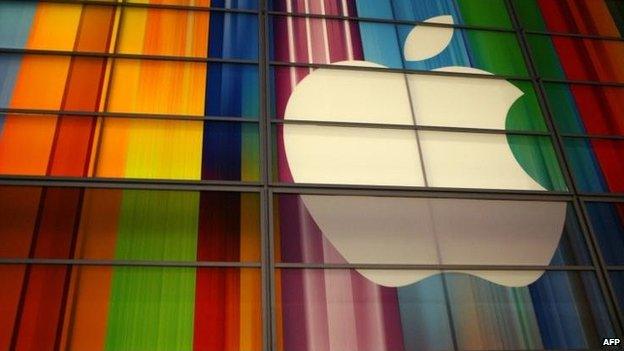Obama, Apple and the tax issue
- Published
- comments

First, a hat-tip, as they call it on Twitter.
Apple is an astonishing success. It sells a small suite of expensive devices with which its customers have an almost religious relationship.
People queue outside its stores in the snow (Japan) to buy the latest version of its products, which are often just a little better than the previous, rather good, version.
People are willing to resort to fists (Paris) to get the precise Apple product they want.
Customers - supposedly "austerity focused" - are happy to pay high prices to be associated with the Apple brand, which, at $124bn (according to Forbes, external), is the most valuable in the world.
Its gross profit margin is 40%. For Exxon, which held the world's most profitable company mantel until last night, it is 34%.
When Apple decides to make a new product or launch a new service - think iPod, iTunes, iPhone and iPad - it often defines a whole new sector category.
And leaves competitors struggling to beat, ape or simply rip-off its products.
But today's mega-profits will once again raise a difficult issue.
If a company is making so much money - should it be paying more in tax?
President Barack Obama has made it clear he believes the present global corporation tax system is not fit for purpose.
Jacob Lew, the Treasury Secretary, wrote to Senators last June laying out the President's arguments. You can read the letter here, external.
Many believe his position will only be strengthened by Apple's results.
Apple, like many technology companies, structures itself so that it pays some of its tax in jurisdictions where rates are low.
In Apple's case, 60% of its profits are managed through three businesses based in Ireland where tax rates and the "double Irish" mechanism mean that companies can reduce their tax liabilities.
Google and Facebook also have major businesses in the country.
All this is perfectly legal - and controversial. Under global pressure, Ireland has said it will close the "double Irish", one of its more corporately advantageous tax structures.
President Obama, like our very own George Osborne, has made it clear he wants companies to pay more tax in the country where sales and profits are highest.
That could mean windfalls for countries like the US and the UK, where technology penetration is remarkably high.
According to a Senate report, Apple "avoided" paying $9bn in US taxes in one year. At present it retains 89% of its balance sheet cash outside America where corporation tax is high at 35%.
Many attack Apple for how it operates. Tim Cook, Apple's chief executive, has been accused of running a company which, according to Senator John McCain, is "one of the biggest tax avoiders in the country".
Others take a different view. Businesses are simply following the rules, it is argued, and Apple did pay $6bn in taxes in the US in 2013.
Its huge profits also allow its investors - which include our pension funds - to make a good return.
Governments set differential tax rates to encourage businesses to move location and create jobs.
To then attack those companies for following the tax rules removes responsibility from the very politicians who control the system.
"I'm offended by the tone and tenor of this hearing," Senator Rand Paul said when Mr Cook was called before a hearing on tax issues last year.
"I'm offended by the spectacle of dragging in executives from a company that is not doing anything illegal.
"If anyone should be on trial here it should be Congress. I frankly think the committee should apologise to Apple."
President Obama wants to change the rules.
Mr Osborne wants to change the rules - and has already announced that profits made in the UK by foreign companies that use global tax structures will be higher.
But global agreement will be difficult. And while it is, Apple's profits will continue to be off the scale.